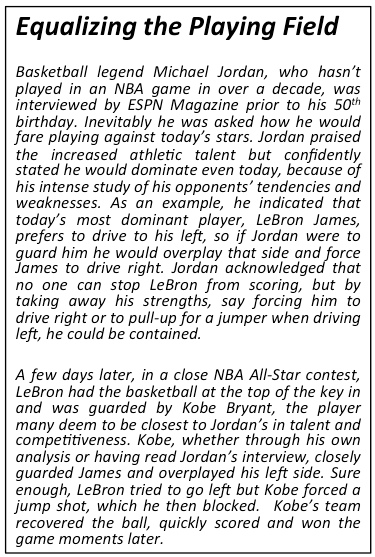Predictive Analytics - Gaining a Competitive Edge
/Law firm leaders who embrace predictive analytics to manage their businesses and their practices can establish a sustainable competitive advantage over competitors who rely on gut instinct and sheer intellect to leader their enterprises. There are multiple opportunities to employ predictive analytics in a law firm: to run the business more efficiently and effectively; to pursue more lucrative clients and engagements; to recruit and train lawyers for success and longevity; and to practice law in such a way as to be a step ahead at all times.
Join me in New York or Boston as I discuss the role of Predictive Analytics in a law firm: Register
Michael Lewis, in his book Moneyball, later made into a movie, uses baseball as a metaphor for the power of predictive analytics. Many people assume the book is about baseball. In fact, baseball is just the setting. The point of the book is to demonstrate how insightful leaders, using data that may be readily available but ignored by most, can gain a competitive edge. But one doesn't have to know anything about or even like baseball to gain valuable lessons. During my tenure as a corporate executive, I would purchase this book for all of my senior managers in order to foster a culture of predictive analytics in our business.
In a recent talk delivered at the LSSO Raindance Conference, Boston Celtics president Rich Gotham discussed the role of predictive analytics in managing a major sports franchise. He acknowledged the heavy use of analytics on the court – the Celtics coaches regularly analyzed opponents’ tendencies and then devised game plans to exploit weaknesses. But Gotham went on to describe the critical importance predictive analytics play off the court as well. As he explained, team management has to know who to target in order to sell the most tickets. They need to know which combination of price and amenities will appeal to different target markets.
For example, by rigorously studying patterns in renewals and cancellations of luxury boxes, Celtics management discovered a critical miss in their sales strategy. The target demographic for luxury box suites is high net worth individuals and corporate executives, but these buyers are also the most likely to have other commitments, including regular out-of-town travel, which limit their availability to attend multiple home games.  The Celtics addressed this problem in part by creating a secondary ticket market for luxury suite owners. If a luxury suite ticket holder can't make a game, the team will help resell that ticket. This approach removed the box holders’ concerns about a wasted investment and significantly improved the luxury box renewal rate.
The Celtics addressed this problem in part by creating a secondary ticket market for luxury suite owners. If a luxury suite ticket holder can't make a game, the team will help resell that ticket. This approach removed the box holders’ concerns about a wasted investment and significantly improved the luxury box renewal rate.
How does this apply to law firm leadership? Very simply, there are data available today that leaders ignore, instead relying on instinct and intellect to manage their enterprises.
In Moneyball, the crusty old baseball scouts who eschewed data but could recognize a “baseball body” were, statistically speaking, wrong far more than they were right. This is not unlike recruiting in the modern law firm, where top grades from top law schools are used as a proxy for quality, when other factors are likely to play a stronger role in the recruit’s chance of success and longevity in the firm.
In countless practice group retreats when we list our client targets for the coming year, inevitably we identify multi-national companies with big legal budgets, or existing clients who have represented large billings in the past. In fact, deeper analysis may reveal that our most lucrative clients are, for example, companies with less than $0.5 billion in revenues, doing business in a narrow range of SIC codes, with a certain geographic footprint and a management profile that suits our lawyers’ personalities. Yet we ignore those prospects in lieu of the fruitless pursuit, along with hundreds of competitors, of the same old FTSE 100 or Fortune 500 companies.
And yes, these concepts apply even to the practice of law. The increase of project management and process improvement has illuminated for lawyers that while every matter may be unique, each is likely comprised of tasks that we’ve tackled countless times previously. As we learn how to break matters into component tasks, we recognize that reassembling these tasks into new combinations for purposes of budget forecasting gives us a competitive edge – not only can we confidently price a matter based on past performance, but our deeper understanding of how these tasks have interoperated in the past helps us minimize surprise as the matter progresses. Start layering in knowledge about specific adversaries and even judges and jurisdictions, and our reasoned analysis of what’s likely to happen based on what’s happened previously will look like voodoo to an outsider.
I will discuss the role of predictive analytics in two upcoming sessions. The first is in New York on Wednesday, November 6, and the second is in Boston on Thursday, November 7. I will lead an interactive discussion for law firm leaders, practice group leaders, law firm c-level executives and those leading business development and strategy. This will be followed by a reception hosted by Thomson Reuters, the event sponsor. For more details and to register, click here.
Timothy B. Corcoran delivers keynote presentations and conducts workshops to help lawyers, in-house counsel and legal service providers profit in a time of great change. To inquire about his services, contact him at +1.609.557.7311 or at tim@corcoranconsultinggroup.com.



